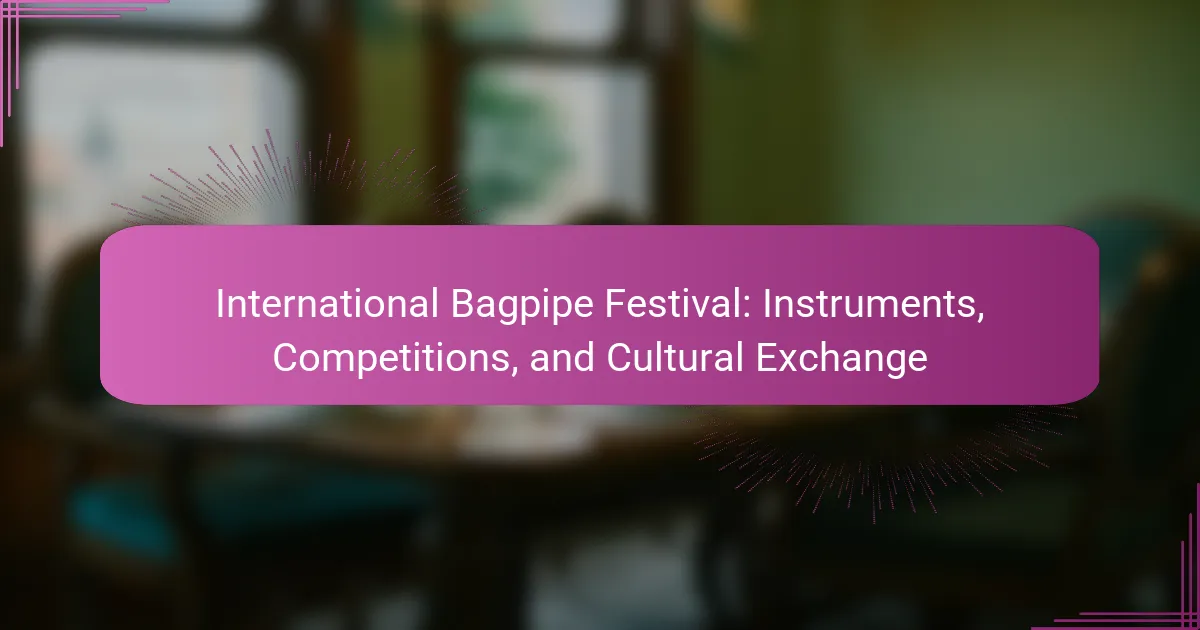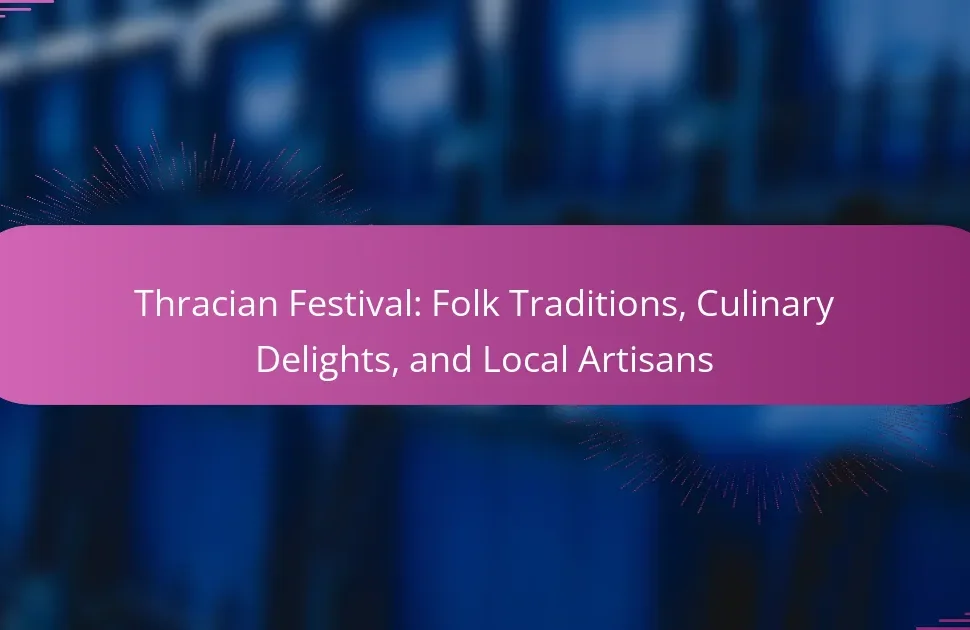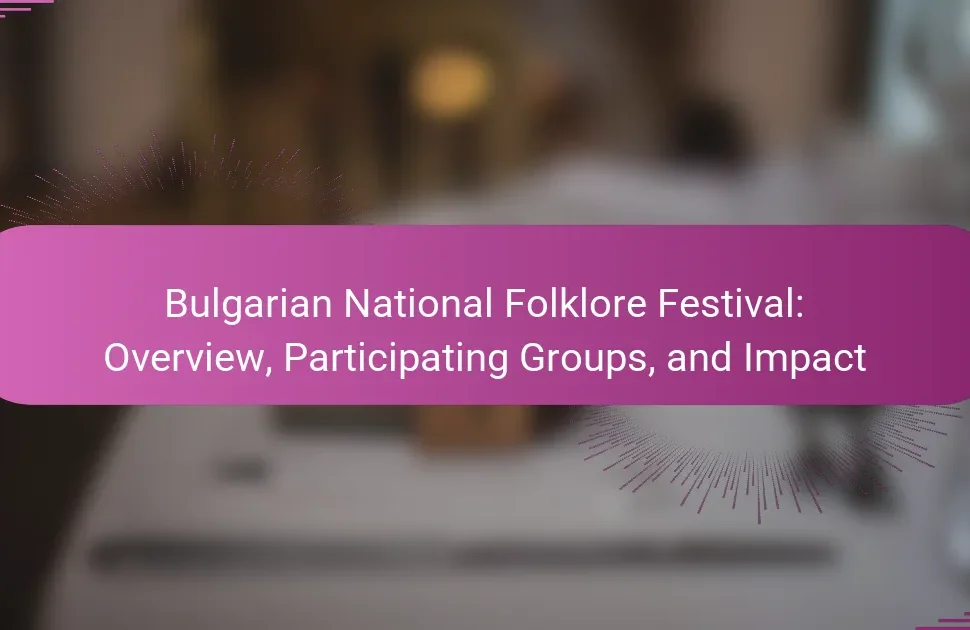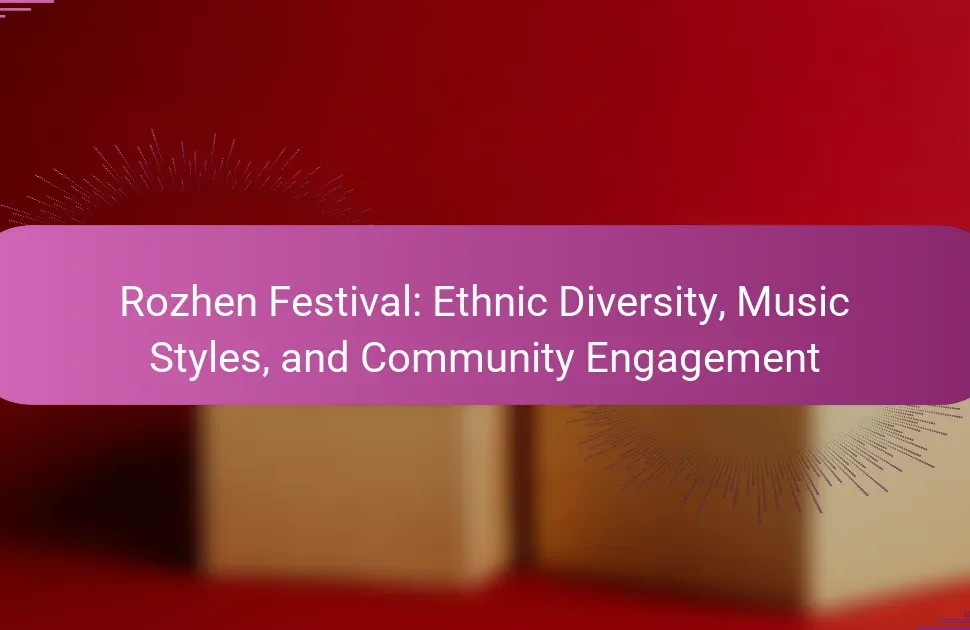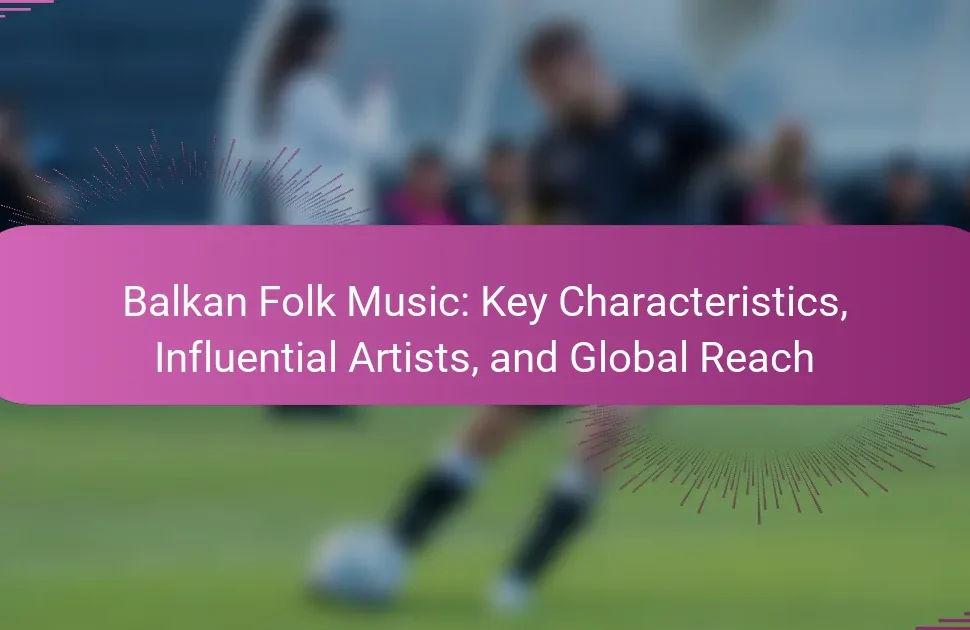The International Bagpipe Festival offers a unique opportunity to explore diverse bagpipe instruments, engage in competitive events, and participate in cultural exchanges. Attendees can learn about traditional and modern bagpipe styles, witness solo and band competitions, and take part in workshops led by expert musicians. The festival fosters community engagement and appreciation for global bagpipe heritage, enhancing understanding through shared musical experiences.
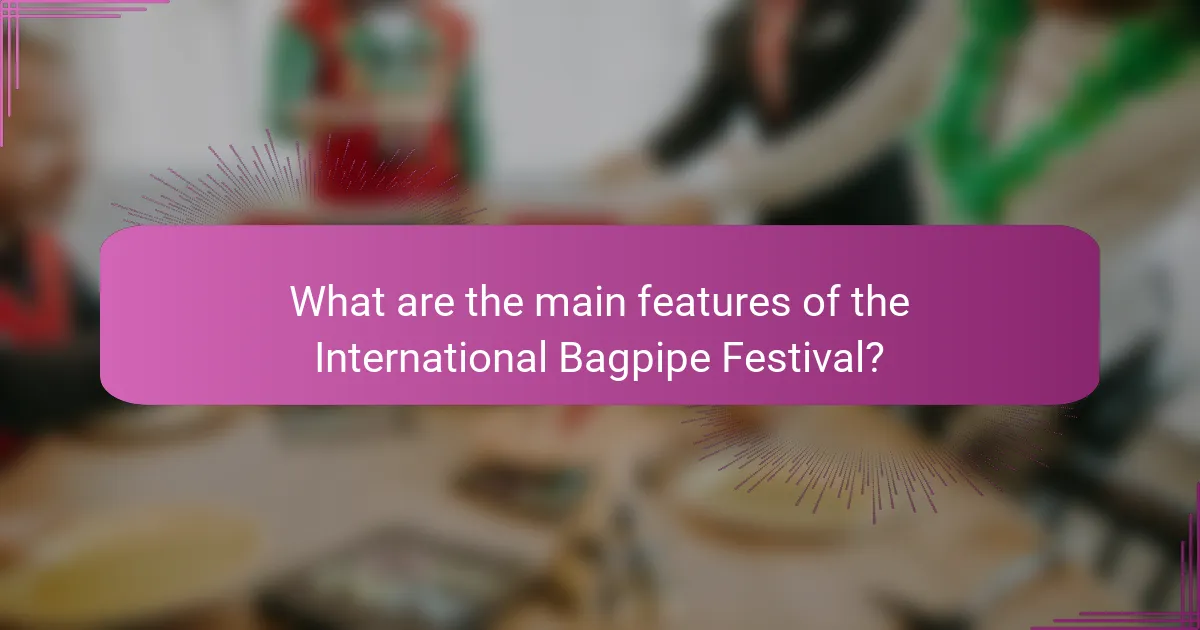
What are the main features of the International Bagpipe Festival?
The International Bagpipe Festival features diverse instruments, competitive events, and vibrant cultural exchanges. Participants showcase various bagpipe styles, including traditional and modern forms. Competitions highlight skill levels, fostering camaraderie among musicians. Cultural exchange activities enrich understanding of bagpipe heritage, celebrating its global significance. The festival also includes workshops, allowing attendees to learn techniques from expert players.
How do bagpipe instruments vary across different cultures?
Bagpipe instruments vary significantly across cultures, reflecting unique traditions and musical styles. For instance, the Great Highland Bagpipe from Scotland features a distinct drone and is used in military and ceremonial contexts. In contrast, the Uilleann pipes from Ireland are played indoors and utilize a bellows system, producing a softer, more melodic sound. The Gaita from Spain incorporates a different scale and is often used in folk music. Each variation contributes to the rich tapestry of global bagpipe music, showcasing the cultural significance and adaptability of this instrument.
What role do competitions play in the festival?
Competitions play a vital role in the International Bagpipe Festival by showcasing talent and fostering cultural exchange. These events allow musicians to demonstrate their skills, engage audiences, and promote the rich heritage of bagpipe music. Participants gain recognition and opportunities for collaboration, enhancing the festival’s community spirit. Competitions also attract diverse participants, enriching the cultural tapestry of the event.
How does cultural exchange enhance the festival experience?
Cultural exchange significantly enhances the festival experience by fostering connections among participants. It promotes understanding and appreciation of diverse musical traditions, enriching performances and interactions. Attendees engage through workshops, sharing techniques and stories, which deepens cultural appreciation. This exchange creates a vibrant atmosphere, making the festival a unique celebration of unity through music.
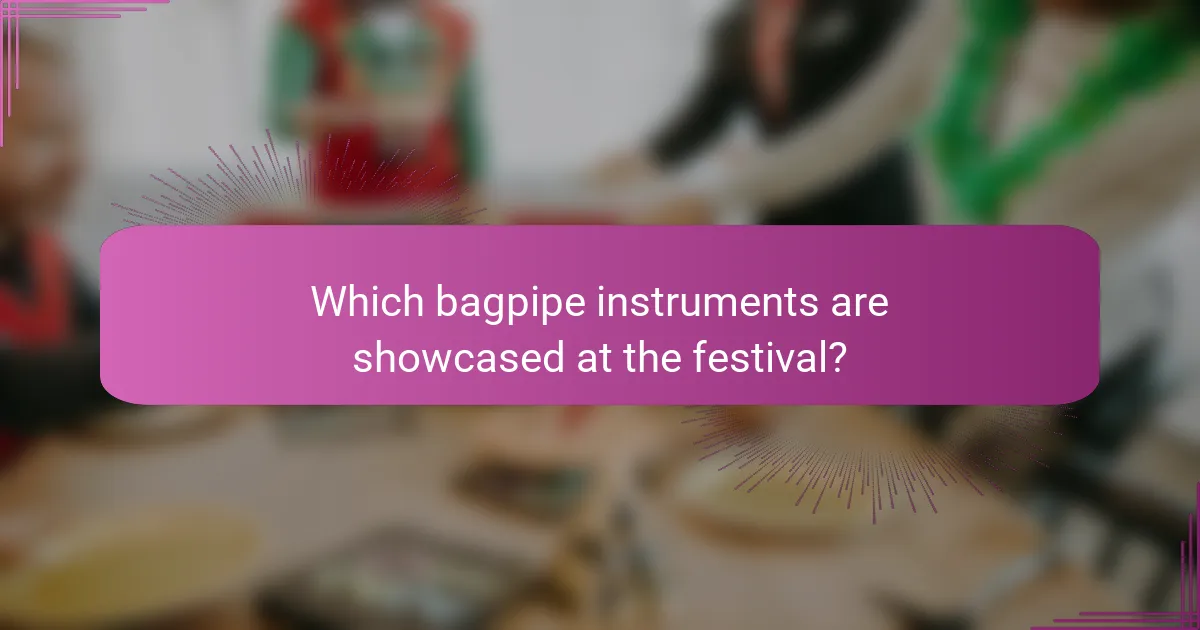
Which bagpipe instruments are showcased at the festival?
The festival showcases a variety of bagpipe instruments, including the Great Highland Bagpipe, Uilleann Pipes, and Northumbrian Pipes. Each instrument represents unique cultural traditions and playing styles. For example, the Great Highland Bagpipe is known for its loud, powerful sound and is often associated with Scottish heritage. The Uilleann Pipes, originating from Ireland, are characterized by their softer tone and complex melodies. The Northumbrian Pipes offer a distinct sound with a focus on intricate ornamentation. These instruments collectively highlight the rich diversity of bagpipe music.
What distinguishes traditional bagpipes from modern adaptations?
Traditional bagpipes typically feature a simpler construction and materials, while modern adaptations often incorporate advanced technology and design for enhanced sound and playability. Traditional versions use natural materials like wood and animal skins, whereas modern bagpipes may utilize synthetic materials for durability. Additionally, modern adaptations may include features like electronic amplification, which are absent in traditional instruments. These distinctions reflect the evolution of bagpipes in both cultural and musical contexts.
How do regional variations influence bagpipe design and sound?
Regional variations significantly influence bagpipe design and sound by incorporating local materials and cultural traditions. Different regions utilize unique woods, reeds, and crafting techniques, affecting tonal quality and playability. For instance, Scottish bagpipes often feature a distinct drone sound due to specific tuning methods. In contrast, Eastern European bagpipes may employ varied bag materials, resulting in a softer tone. Additionally, regional music styles shape how bagpipes are played, leading to diverse performance techniques and repertoires. This cultural exchange enriches the global bagpipe community, fostering appreciation for diverse musical expressions.
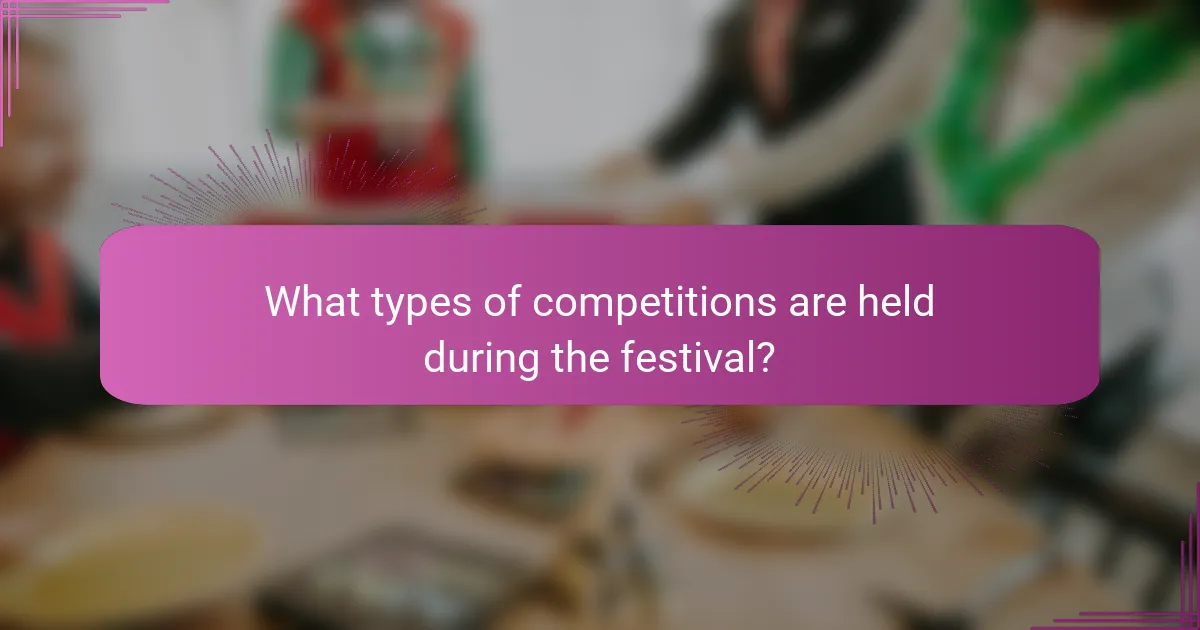
What types of competitions are held during the festival?
The International Bagpipe Festival features various competitions that celebrate bagpipe music and cultural exchange. These include solo performances, band competitions, and traditional dance contests. Each event showcases unique attributes of bagpipe playing and fosters community engagement. Participants can earn awards based on skill level and creativity, enhancing the festival’s vibrant atmosphere.
How are participants judged in bagpipe competitions?
Participants in bagpipe competitions are judged based on their technical skill, musicality, and overall presentation. Judges assess aspects such as tone quality, rhythm accuracy, and the execution of embellishments. Scoring criteria often include precision in playing, adherence to the chosen style, and the emotional impact of the performance. Additionally, judges may consider the competitor’s stage presence and attire, which contribute to the overall impression. Each competition may have specific guidelines that further define the judging process, ensuring a fair evaluation of all participants.
What are the most prestigious awards at the festival?
The most prestigious awards at the International Bagpipe Festival include the Best Solo Performance, Best Band Performance, and the Best Cultural Exchange Award. These accolades recognize exceptional talent and promote cultural appreciation within the bagpipe community. Winning these awards often enhances an artist’s reputation and opens opportunities for further participation in international competitions.
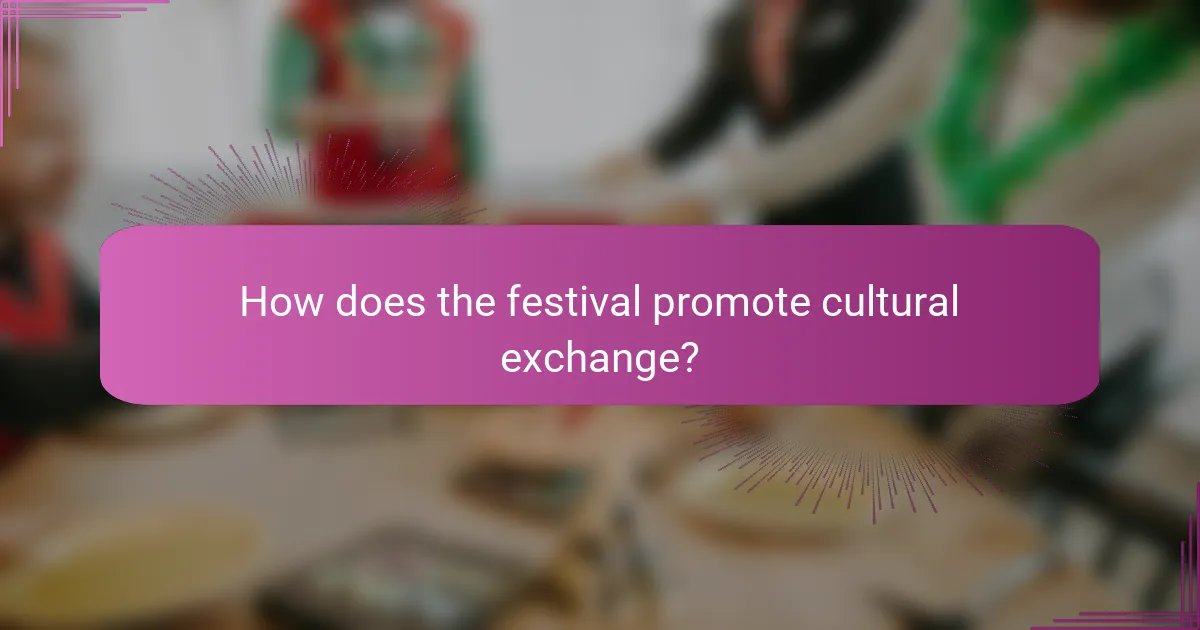
How does the festival promote cultural exchange?
The International Bagpipe Festival promotes cultural exchange by bringing together diverse musicians and audiences from various regions. It features performances that showcase traditional bagpipe music, fostering appreciation for different cultural heritages. Workshops and competitions allow participants to learn from each other, enhancing cross-cultural dialogue. This unique gathering strengthens community ties and celebrates the universal language of music.
What activities facilitate interaction among international participants?
The International Bagpipe Festival promotes interaction among participants through workshops, competitions, and cultural performances. These activities encourage collaboration and exchange of musical techniques and traditions. Participants engage in jam sessions, allowing for spontaneous collaboration and creativity. Networking events facilitate connections between musicians and cultural enthusiasts, fostering friendships and cultural understanding. Additionally, cultural showcases highlight diverse bagpipe traditions, enhancing appreciation for global musical heritage.
How do workshops contribute to cultural understanding?
Workshops at the International Bagpipe Festival enhance cultural understanding by promoting direct interaction among participants. They facilitate the sharing of musical traditions and techniques, fostering appreciation for diverse cultural backgrounds. Through hands-on experiences, attendees learn about the historical significance of bagpipes in various cultures, creating connections that transcend language barriers. Additionally, competitions showcase unique styles and innovations, encouraging dialogue and exchange between different cultural representations of the instrument.
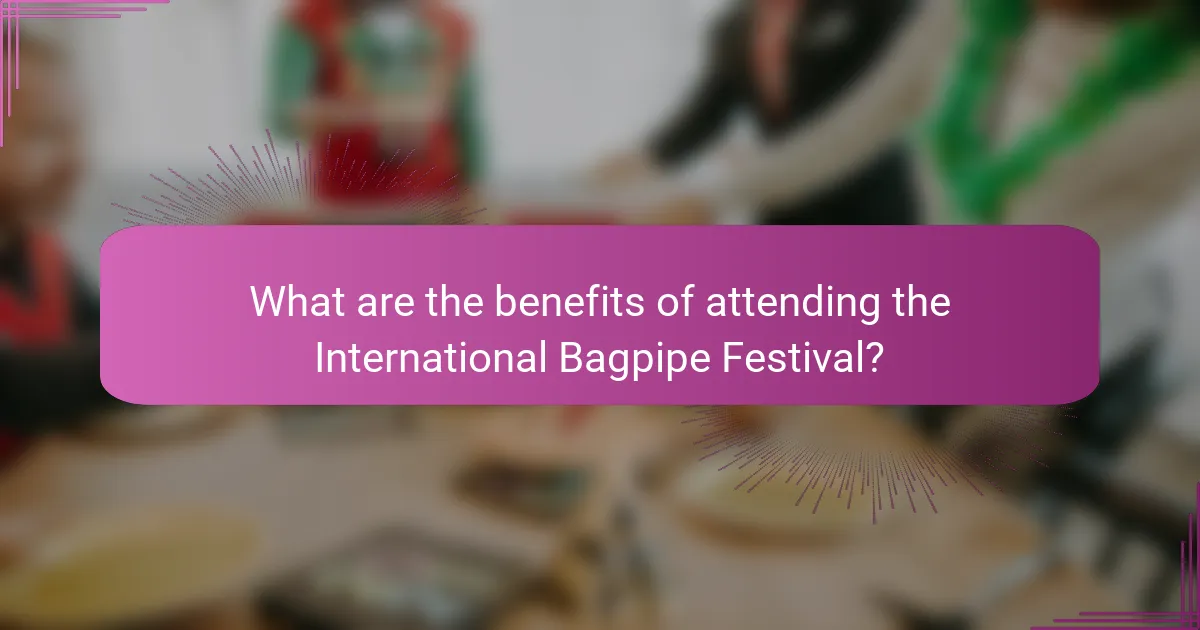
What are the benefits of attending the International Bagpipe Festival?
Attending the International Bagpipe Festival offers numerous benefits, including cultural exchange, musical education, and community engagement. Participants experience diverse performances, enhancing their appreciation for bagpipe music. Competitions showcase talent, fostering a sense of camaraderie among musicians. Additionally, workshops provide hands-on learning opportunities, allowing attendees to develop their skills. This festival celebrates heritage while promoting global connections through shared musical traditions.
How can attendees engage with performers and learn about bagpipe music?
Attendees can engage with performers and learn about bagpipe music through interactive workshops, Q&A sessions, and live demonstrations. These activities foster direct communication and provide insights into playing techniques and cultural significance. Engaging with experienced musicians enhances understanding and appreciation of the art form. Additionally, festival programs often include opportunities to participate in group sessions, allowing attendees to practice alongside professionals.
What unique experiences can festival-goers expect in 2025?
Festival-goers can expect immersive cultural experiences, unique competitions, and diverse musical performances at the International Bagpipe Festival in 2025. Attendees will engage with skilled musicians showcasing traditional and contemporary bagpipe styles. Unique workshops will offer hands-on learning opportunities, enhancing appreciation for this rich musical heritage. Cultural exchange activities will foster connections among participants from various regions, promoting a deeper understanding of bagpipe traditions worldwide.
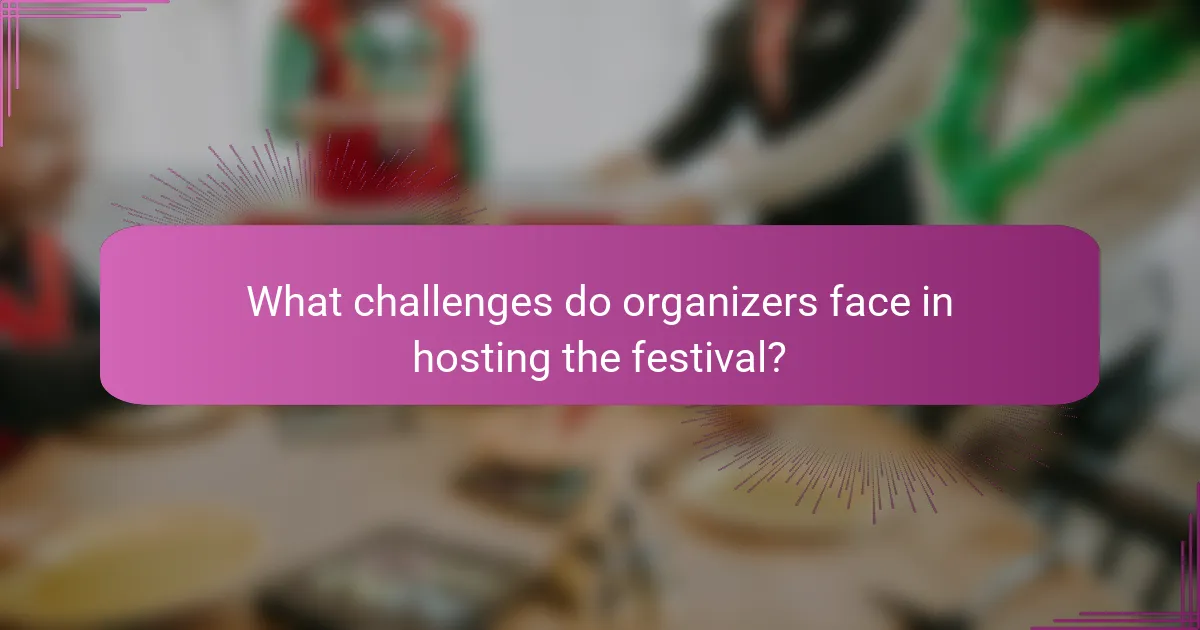
What challenges do organizers face in hosting the festival?
Organizers face numerous challenges when hosting the International Bagpipe Festival. Key issues include securing funding, managing logistics, and coordinating with diverse cultural groups.
Funding is often limited, requiring organizers to seek sponsorships and grants. Logistics involve venue selection, equipment rental, and scheduling performances. Additionally, engaging various cultural representatives can lead to misunderstandings, complicating collaboration.
Weather conditions can also pose risks, potentially affecting outdoor events. Lastly, ensuring participant safety and compliance with regulations is crucial for a successful festival.
How do logistical considerations impact festival planning?
Logistical considerations significantly impact festival planning by ensuring smooth operations and enhancing participant experiences. Effective transportation arrangements, venue accessibility, and resource allocation are crucial for the International Bagpipe Festival. For example, coordinating instrument transportation and scheduling competitions requires meticulous planning to avoid delays. Additionally, cultural exchange activities depend on logistical efficiency, enabling international participants to engage seamlessly. Overall, a well-structured logistics plan fosters a successful festival atmosphere.
What measures are taken to ensure inclusivity and accessibility?
The International Bagpipe Festival prioritizes inclusivity and accessibility through various measures. These include providing wheelchair access, offering sign language interpretation, and ensuring diverse programming that represents various cultures. Additionally, the festival collaborates with local organizations to facilitate transportation for attendees with disabilities. By adopting these practices, the festival fosters an environment where everyone can participate and enjoy the cultural exchange.
What common mistakes should organizers avoid?
Organizers should avoid poor planning, inadequate promotion, and neglecting participant needs. Effective communication and clear scheduling are essential for success.
1. Failing to set clear objectives can lead to confusion.
2. Not engaging with the community may reduce attendance.
3. Overlooking logistical details can disrupt events.
4. Ignoring feedback from participants can hinder improvement.
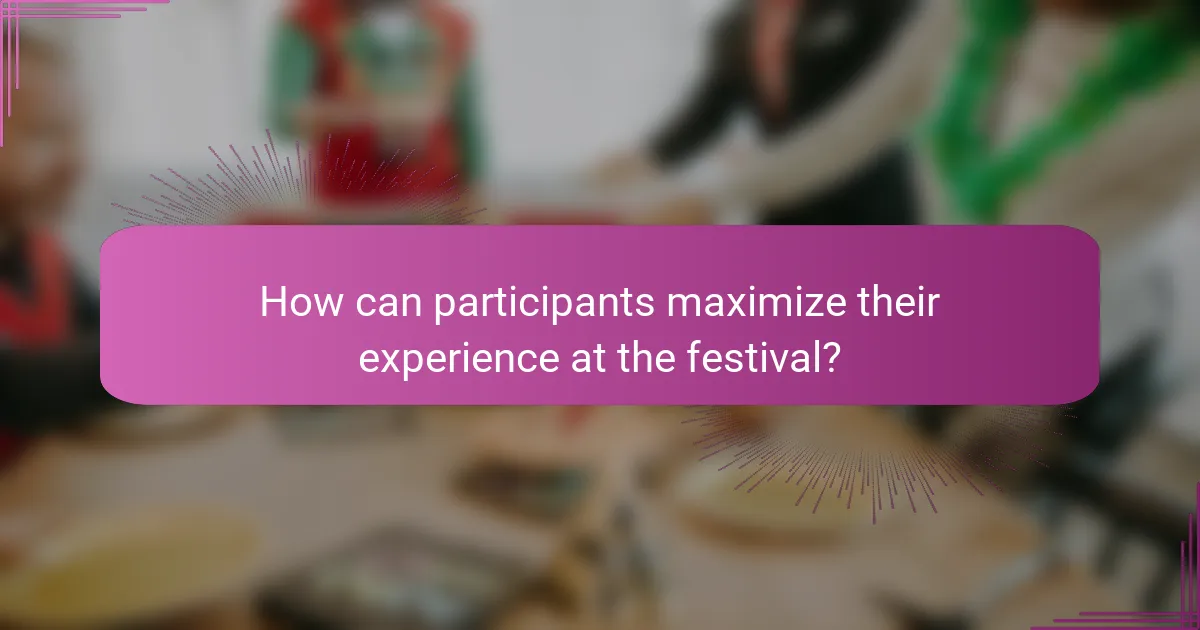
How can participants maximize their experience at the festival?
Participants can maximize their experience at the International Bagpipe Festival by engaging actively in various activities. Attend workshops to learn about different bagpipe instruments and techniques. Compete in friendly contests to showcase skills and gain feedback. Explore cultural exchanges to deepen understanding of bagpipe traditions across nations. Connect with other enthusiasts for networking and shared experiences. Enjoy live performances to appreciate diverse styles and musical expressions.
What tips do seasoned attendees offer for first-time visitors?
Seasoned attendees recommend planning ahead, engaging with performers, and exploring local culture. Arrive early to secure good viewing spots during competitions. Participate in workshops to enhance your skills and meet fellow enthusiasts. Don’t hesitate to ask questions; the community is welcoming and eager to share knowledge. Enjoy the diverse musical styles presented at the festival for a richer experience.
How can performers prepare for a successful competition?
Performers can prepare for a successful competition by practicing diligently, understanding the competition rules, and developing a strong stage presence. They should also engage in physical and mental conditioning to enhance their performance.
1. Establish a consistent practice schedule to refine skills.
2. Study previous competitions to identify judging criteria.
3. Create a performance plan that includes staging and audience engagement.
4. Collaborate with fellow musicians for feedback and support.
5. Maintain physical fitness to ensure stamina during performances.
6. Visualize success to build confidence and reduce anxiety.
What are best practices for engaging with other cultures during the festival?
Engaging with other cultures during the International Bagpipe Festival enhances the experience for all participants. Prioritize respectful communication and openness to diverse traditions.
Participate in workshops to learn about different bagpipe styles and their cultural significance. Attend performances to appreciate various interpretations of music.
Share your own culture through storytelling and music, fostering a two-way exchange. Encourage collaboration among musicians from different backgrounds to create unique performances.
Lastly, embrace local customs and practices, which can enrich your understanding of the festival’s cultural context.
